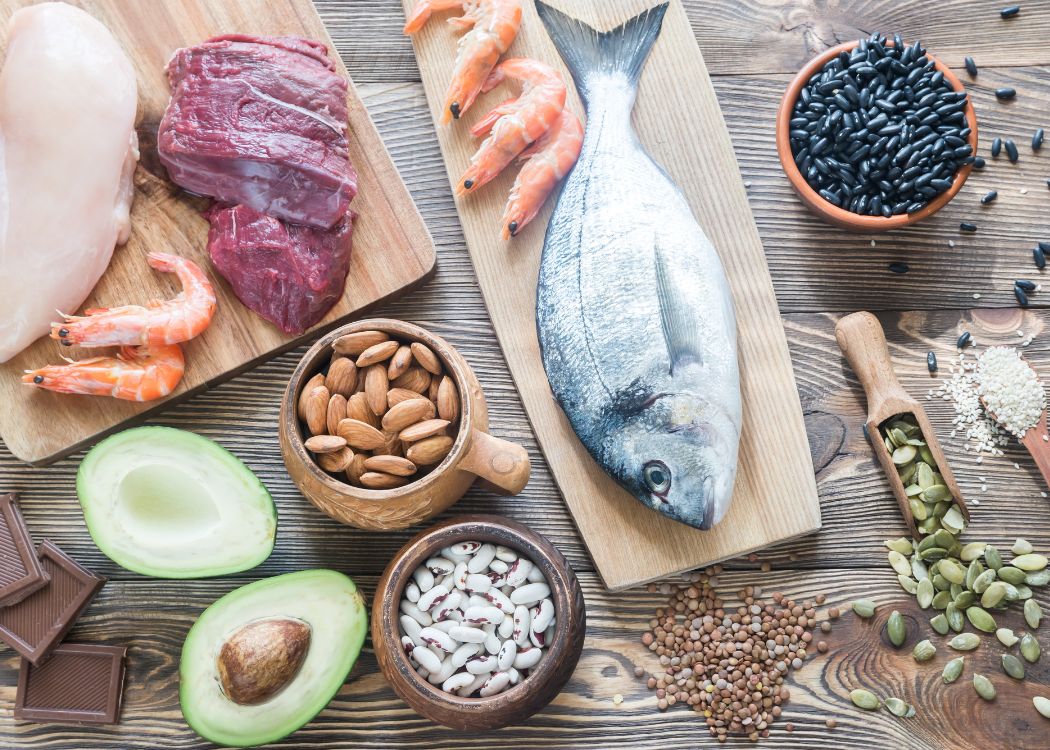Zinc: The Benefits, Dosage and Side Effects To Consider
Zinc is an essential trace mineral that contributes to the proper functioning of the body. Zinc is a mineral found in animal and plant foods. You may have spied it in your skin or hair supplement, but zinc does much more than this. Let’s explore zinc now.
By Nina Sabat (BSc Hons Dip NT)
What Are The Health Benefits of Zinc?
The mineral zinc occurs naturally in animal and plant foods, and since your body doesn’t make it, your diet is your primary source. You may have spotted zinc before in your multi or skin, hair and nails supplements. However, when it comes to your wellbeing, zinc does much more than this.
This article covers EVERYTHING you’ve always wanted to know about zinc, including research-backed zinc health benefits, the ideal zinc dosage and how to avoid any zinc side effects. You’ll also find info on deficiency symptoms and what puts you at risk, the foods that are high in zinc, and some quick links to help you shop Revital’s extensive range of zinc supplements.
What is Zinc?
Ask the simple question, What is zinc? and you’ll find a wealth of answers.
- Zinc is one of the most common elements in the Earth's crust and is found in rocks, soil, air and water
- Zinc is essential for the growth and development of plants, animals and humans
- After iron, zinc is the next most abundant mineral in the human body
- Zinc is classified as a trace mineral, as only very small quantities are needed for zinc to have a big benefit on your health
What is Zinc Good For?
For a mineral that is needed in such small amounts, zinc is a surprisingly big hitter. For starters, zinc assists more than 300 different enzymes to spark metabolic reactions in your body. 80 of these enzymes are involved in making proteins and correctly copying DNA.
This extensive role is the reason why zinc is good for supporting your body in so many ways.
- Zinc is required for normal growth and development, during pregnancy, childhood and in adult years
- Zinc regulates the production and activation of cells in your immune system and regulates signalling molecules which coordinate your immune response
- As an antioxidant, zinc helps to protect cells from oxidative stress
- Zinc is a necessary mineral to maintain the proper functioning of taste and smell receptors which stimulate your appetite
- Zinc contributes to digestive health, eye health, mental health, reproductive health AND the condition of your skin, hair and nails

Health Benefits of Zinc
Zinc is a key mineral that helps maintain your general health, practically from top to toe. But what are the situations where your need for zinc might increase?
One reason to supplement zinc is to correct a nutritional deficiency, and we’ll explore zinc deficiency symptoms next. But research suggests there are other zinc benefits to health.
1. Zinc supports the immune system
Zinc is a crucial nutrient for maintaining a healthy immune system.
In studies, zinc is effective against the common cold. In trials where participants took zinc lozenges – for instance within a day of developing a cold [1] or every 2 to 3 hrs for up to 14 days [2] – taking a o helped participants recover 2 to 3 days faster compared to those who took a placebo.
Another study found a total of 75mg zinc per day was needed to achieve this cold-busting effect. [3]
2. Zinc promotes wound healing
Zinc is also important for wound healing.
Zinc is involved in many aspects of the healing process, including the controlled inflammation, increased cell production and tissue growth that takes place. You also need blood vessels to bring a steady supply of nutrients to new tissue – zinc helps with that.
You will often find zinc on the ingredients list of creams and ointments used to promote the healing of ulcers and skin wounds.
3. Zinc prevents infections
Zinc also plays a role in maintaining the integrity of skin and mucous membranes, creating a healthy barrier which can help to prevent infections.
4. Zinc supports reproductive health
Zinc is important for reproductive health in both women and men.
Zinc has a critical role in several aspects of mammalian reproduction. Whether it’s egg growth and maturation, fertilisation, or embryo and placenta development, zinc is involved. [4] In women, zinc has been identified as being instrumental in early development, where a flux in zinc levels – the zinc spark - marks the transition of a mature egg into a developing embryo. [5]
In men, zinc is involved in the production of testosterone and sperm, and lower seminal zinc concentrations have been measured in men with infertility. [6]
n studies, zinc supplementation has been found effective for improving the quality, volume and motility of sperm in men with infertility. [7]
5. Zinc may reduce the risk of age-related macular degeneration (AMD)
With high concentrations of zinc in the retina, zinc may protect eye health and help maintain vision in later life.
In observational studies which found an association between zinc intake and AMD in older populations, people with the highest zinc intake, from food and supplements, had a lower risk of developing AMD.
In one study, the AMD risk of those in the top 10% of zinc intake was a whopping 44% lower compared to those who had a lower intake. [8]
In the AREDS clinical trial, where participants with mild AMD took a supplement of high dose zinc (80mg) combined with vitamin E, C, beta carotene and copper, their risk of developing advanced AMD was 25% lower than those who took a placebo. [9]
6. Zinc may improve acne symptoms
Zinc may be effective for acne symptoms.
In one systematic review and analysis, researchers scoured 25 studies with 2445 acne patients to investigate the significance of zinc to their health.
Their first finding was that people with acne typically had significantly lower zinc levels.
The second was that their skin condition improved significantly when zinc was either applied topically or taken as a supplement. This was measured as a reduction in the number of acne papules, a typical sign of the skin being markedly inflamed. [10]
Zinc Deficiency Symptoms
How can you tell if you’re not getting enough zinc to meet your body’s requirements?
Commonly experienced zinc deficiency symptoms include:
- Frequent coughs and colds
- Wounds which heal slowly
- Skin problems like acne
- Hair loss
- Being more forgetful
- Loss of appetite
In children, development and growth may be delayed and concentration reduced.
Are You at Risk of a Zinc Deficiency?
Zinc deficiency is typically seen in people from low and middle-income countries, and while zinc deficiency is less common in high income countries and Western countries, zinc insufficiency does occur.
In Western and high-income countries, malnutrition is the primary cause of zinc insufficiency, but some people have an inability to properly absorb zinc in the intestines. Also, during pregnancy zinc needs increase.
Groups at risk include:
- People with malnutrition - children, the elderly and those who are vegetarian, vegan or eat a restricted diet are most at risk [11]
- People with GI disorders
- People who’ve had bariatric surgery
- People with alcohol use disorder and a poor diet
- People who are pregnant or breastfeeding
- Babies 6 months and older who are exclusively breast fed
- Children with sickle cell disease
A key point here is that in the West, despite the apparent abundance of food, it is still possible to be malnourished and at risk of zinc deficiency. Let’s continue by exploring which foods have the highest amounts of zinc.
Foods High in Zinc
When it comes to choosing foods high in zinc, shellfish, red meat and offal are some of the richest sources. [12]
- Shellfish – Cooked oysters are one of the top food sources of zinc, with around 61mg of zinc per 100g serving. Crab and mussels are also good sources of zinc
- Meat – Providing around 7mg per 100g serving, beef is a very good source of zinc. Other meat, like lamb, pork or chicken are also adequate choices
- Offal – Chicken livers and kidneys are good sources of zinc, providing around 3-4mg of zinc per 100mg serving
- Eggs and Dairy – Dairy products, such as milk, cheese, and yogurt, are adequate sources of zinc, with around 1-2mg of zinc per 100g

Seeds, beans, nuts and grains provide the zinc in a plant-based diet. However, these foods are not so high in zinc and absorption can be inhibited, which is why vegans and vegetarians are amongst those with the highest risk of zinc deficiency.
- Seeds, beans, nuts and wholegrains – Pumpkin and sesame seeds, chickpeas and lentils, cashews and almonds, and rice and quinoa are all adequate plant-based sources of zinc providing around 1-3mg zinc per 100g. Unfortunately, bioavailability is lower due to the phytates that are also present in these foods
- Fortified foods – Flour, milk, biscuits and cereal may have zinc added in by the manufacturers which, depending on the nutrient mix, may improve your nutritional status [13]
Zinc Dosage
The recommended daily intake of zinc is set according to age, sex, and life stage.
This table presents the recommendations for how much zinc you need per day. The ‘upper limit’ shows daily zinc intake from all sources – food, drinks, supplements and medicine.
| How much zinc do you need per day? | |||||
| Age | Female | Pregnancy | Lactation | Male | Upper Limit |
|
Babies 0-6 months |
2 mg |
|
|
2 mg |
4 mg |
|
Infants 7-12 months |
3 mg |
|
|
3 mg |
5 mg |
|
Children 1-3 years |
3 mg |
|
|
3 mg |
7 mg |
|
Children 4-8 years |
5 mg |
|
|
5 mg |
12 mg |
|
Children 9-13 years |
8 mg |
|
|
8 mg |
23 mg |
|
Teens 14-18 years |
9 mg |
12 mg |
13 mg |
11 mg |
34 mg |
|
Adults 19+ years |
8 mg |
11 mg |
12 mg |
11 mg |
40 mg |
|
Elders 65+ years |
11 mg |
|
|
11 mg |
40 mg |
Source: Zinc Factsheet, National Institutes of Health
But how much zinc per day do you need from a supplement?
- Generally, it’s best to start with your individual status (age, sex etc), and then consider your overall health (GI conditions etc) and the type of diet you usually eat (vegan, vegetarian, etc). This can help you decide on your supplement strength.
- Many adult multis contain around 5 – 10mg of zinc, but some may have as much as 25mg
- If you’re taking 2 or 3 different supplements (e.g. a multi + a hair supplement) check the potency to confirm that you’re not unknowingly taking an excessive amount of zinc
- While most of the clinical trials used high amounts of zinc, as much as 80mg daily, this was for a very short duration. Unless you’re under guidance, it’s best not to take more zinc than the upper limit above
Side Effects of Zinc
Zinc is generally well tolerated at the recommended doses, although some people can get an upset stomach. Taking zinc with or after food normally sorts this out.
However, an excessive zinc intake can cause unwanted side effects, including:
- digestive upset, nausea and vomiting
- headache
- reduced immune function
- reduced absorption of other minerals like magnesium (at doses of 142mg/day)
- copper deficiency (at doses of 50mg or more)
A Quick Summary of Zinc
Zinc is a key mineral for human growth, development and health and it’s important to get enough to meet your daily requirements. Foods high in zinc include meat and shellfish. Plant-based diets are generally poorer, which is why vegetarians and vegans have a higher risk of having a zinc deficiency. Children, the elderly and pregnant people can also be at risk too.
Taking a zinc supplement can correct a zinc deficiency and help reduce associated symptoms which range from catching frequent colds, loss of appetite to finding it hard to concentrate. Clinical trials suggest zinc benefits include supporting the immune system, promoting wound healing, reducing AMD risk and clearing acne-prone skin. For men, zinc also has a role in supporting fertility.
Factors like your age, health, lifestyle and diet can help you decide how much zinc to take per day. A typical multi may provide around 15mg but some higher strength multis contain 25mg per serving. It’s always a good idea to speak with a healthcare provider before starting any new dietary supplement, including zinc, especially if you have a medical condition or are already taking any medications.

Shop Revital’s Range of Zinc Supplements
Multivitamins for a daily dose of zinc
- Try Pure Encapsulation's O.N.E Multivitamin – a one-a-day capsule with 25mg of zinc
- or Biocare's Methyl Multinutrient – with15mg of zinc per serving
Zinc for extra immune support
- Try Together Health Immune with 10mg zinc per capsule
- or Solgar's Flavo Zinc Lozenges with 25mg zinc per lozenge
Zinc to boost your skin, hair and nails
- Try Nature's Plus Bioadvanced Hair, Skin & Nails with 10mg zinc per serving
- or Viridian's Clear Skin Complex with 8mg zinc per serving
Zinc for vision and eye health
- Try One Nutrition's Macu Complete with 3.64mg zinc per serving
- or MTHK's Eye Vitamins with 10mg zinc per serving
Test and top up your zinc levels
- With Lambert's Zincatest https://www.revital.co.uk/products/lamberts-zincatest-100ml?variant=37186616819870
References
[1] Prasad A. et al (2008) Duration and severity of symptoms and levels of plasma interleukin-1 receptor antagonist, soluble tumor necrosis factor receptor, and adhesion molecules in patients with common cold treated with zinc acetate
[2] Turner, R. & Cetnarowski, W. (2000) Effect of treatment with zinc gluconate or zinc acetate on experimental and natural colds
[3] Hemilä, H. (2011) Zinc lozenges may shorten the duration of colds: a systematic review
[4] Garner, T. et al (2021) Role of zinc in female reproduction
[5] Duncan, F. et al (2016) The zinc spark is an inorganic signature of human egg activation
[6] Ali, H. et al (2007). Relationship of zinc concentrations in blood and seminal plasma with various semen parameters in infertile subjects.
[7] Fallah, A. et al (2018) Zinc is an Essential Element for Male Fertility: A Review of Zn Roles in Men’s Health, Germination, Sperm Quality, and Fertilization
[8] Tan, J. et al (2008) Dietary antioxidants and the long-term incidence of age-related macular degeneration: the Blue Mountains Eye Study
[9] Age-related eye disease research study group. (2001) A randomized, placebo-controlled, clinical trial of high-dose supplementation with vitamins C and E, beta carotene, and zinc for age-related macular degeneration and vision loss: AREDS report no. 8
[10] Yee, B. et al (2020). Serum zinc levels and efficiency of zinc treatment in acne vulgaris: A systematic review and meta-analysis
[11] Maywald, M. & Rink, L. (2022) Zinc in human health and infectious diseases
[12] Department of Agriculture. FoodData Central
[13] Shah, D. et al (2016) Fortification of staple foods with zinc for improving zinc status and other health outcomes in the general population
About Nina Sabat
Nina Sabat is a BANT-registered Nutritional Therapy Practitioner who applies the principles of Functional Medicine in her practice. Living and working in London she provides online supplement and lifestyle advice for Revital. Nina received her Nutritional Therapy diploma from The Institute for Optimum Nutrition. She also uses her skills gained from studying Life Coaching and Neuroscience, at University College London, to help her clients create meaningful changes to their health.